As we observe our clients, and business trends we believe now is the time to renegotiate and "re-contract" all of your relationships. In our post called the New Rules from early last year we said, “all bets are off” and "all the rules have changed.” Given all of the big pictures changes to doing business in the last 18 months or so the New Rules gave us a way to work with our clients to help them navigate the unprecedented challenges. With the new year, new decade and the passage of time we now believe we have reached the next level and it's an important time to re-evaluate and re-contract. (We also consider this the third step in developing your approach to the year. First step we blogged about was to complete 2009, second step was to create a plan for 2010.)
 It seems to us almost everywhere we look since January 1st there is a new, refreshed attitude, (although we do recognize many are still struggling and we offer our compassion and empathy to those still in the midst of major issues). We see companies "cleaning their closets," making final changes to their rosters and negotiating to buy or merge. We observe people leaving, (or getting ready to leave), their current employment, and starting new jobs. Overall there seems to be a general shift to action mode with a "let’s get to it" attitude.
It seems to us almost everywhere we look since January 1st there is a new, refreshed attitude, (although we do recognize many are still struggling and we offer our compassion and empathy to those still in the midst of major issues). We see companies "cleaning their closets," making final changes to their rosters and negotiating to buy or merge. We observe people leaving, (or getting ready to leave), their current employment, and starting new jobs. Overall there seems to be a general shift to action mode with a "let’s get to it" attitude.
We just attended a workshop for Vistage Chairs, (www.vistage.com), in the Orange County area this week led by a wise teacher, James Newton of Newton Learning Corp. During the discussion, James brought up the concept of "re-contracting" with our CEO groups for 2010. His presentation connected with what I have been experiencing and it has lit a fire to "re-contract" in every area of my life.
There are three fronts to this effort. The first is to "take the offensive" in areas where your suppliers or partners may be planning on re-negotiating your existing relationships and just haven’t gotten to you yet. Take some time to review these relationships and make sure you are clear on what you want, what you are willing to pay, and how you want to move forward in the future. Be proactive so you aren't caught off-guard and unprepared.
The second is to review and update expectations about how things are being done inside your firm. Work with team leaders, department heads, and/or your executives. Get their take on how things are going in their various areas of responsibility and what they see can be improved in 2010. Make as many areas visible and mutually agreed upon as possible in order to have the greatest level of effectiveness and velocity possible.
The third is to re-contract your relationships in the rest of your life. Having authentic conversations during quieter moments regarding mutual expectations and arriving at agreements for who will do what, and how you will solve any breakdowns will take a lot of friction out of your relationships. There will be much more opportunity to enjoy your relationships this coming year if you have taken time to work some things out in advance.
I suggest a very simple formula for re-contracting your relationships:
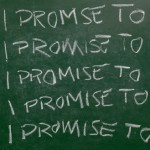 1) Take some time to clearly articulate "what I want from you." Make sure you have reflected before the conversation and are very clear about your priorities. Producing a verbal laundry list is likely to be received with overwhelm so be specific.
2) Take time to listen to "what you want from me." It's critical to be open, curious and receptive. You can't fairly expect to successfully re-contract if you aren't able to really hear what people want from you.
3) Discussion - make sure you have allotted enough uninterrupted time for some thorough discussion.
4) Counter offers - this is critical. Be ready and willing to negotiate.
5) Agreement - the goal is to end the conversation with mutual understanding and acceptance.
1) Take some time to clearly articulate "what I want from you." Make sure you have reflected before the conversation and are very clear about your priorities. Producing a verbal laundry list is likely to be received with overwhelm so be specific.
2) Take time to listen to "what you want from me." It's critical to be open, curious and receptive. You can't fairly expect to successfully re-contract if you aren't able to really hear what people want from you.
3) Discussion - make sure you have allotted enough uninterrupted time for some thorough discussion.
4) Counter offers - this is critical. Be ready and willing to negotiate.
5) Agreement - the goal is to end the conversation with mutual understanding and acceptance.
We'd love to hear about your re-contracting experiences. Let us know how this works for you!

 If you have done the completion work we recommended in our last post, it’s time to move on to creating and documenting your 2010, (or longer), Yonder Star(s) and creating plans for fulfillment.
If you have never taken the time to sit down and map out your Yonder Star, you might start by doing some thinking about real, meaningful New Year’s resolutions. You don't necessarily have to think of something new and different that you have never tried before. Most of us have "chronic resolutions," which are ones that we promise ourselves every year and at some point they get lost along the way. The difference this year should be to create an action plan and a timeline to go with your resolutions/goals. Breaking your vision down into the action steps you need to take to make it a reality will help you see each step of the path. Often big visions are not as daunting when you break them down into manageable pieces. The other key is timing. Create timeframes for your goals that are realistic for you. After you have written it, take your plan and keep it somewhere visible where you can refer to it often. If you bury it in a drawer or file somewhere it will just slip away beneath the current of your life.
If you have done the completion work we recommended in our last post, it’s time to move on to creating and documenting your 2010, (or longer), Yonder Star(s) and creating plans for fulfillment.
If you have never taken the time to sit down and map out your Yonder Star, you might start by doing some thinking about real, meaningful New Year’s resolutions. You don't necessarily have to think of something new and different that you have never tried before. Most of us have "chronic resolutions," which are ones that we promise ourselves every year and at some point they get lost along the way. The difference this year should be to create an action plan and a timeline to go with your resolutions/goals. Breaking your vision down into the action steps you need to take to make it a reality will help you see each step of the path. Often big visions are not as daunting when you break them down into manageable pieces. The other key is timing. Create timeframes for your goals that are realistic for you. After you have written it, take your plan and keep it somewhere visible where you can refer to it often. If you bury it in a drawer or file somewhere it will just slip away beneath the current of your life. stretching yourself enough? Focus on designing the most catalytic, highly leveraged action steps you can. By catalytic we mean that your actions produce the intended results without your being used up in the process. By highly leveraged, we mean you produce very big results with minimal resources.
stretching yourself enough? Focus on designing the most catalytic, highly leveraged action steps you can. By catalytic we mean that your actions produce the intended results without your being used up in the process. By highly leveraged, we mean you produce very big results with minimal resources.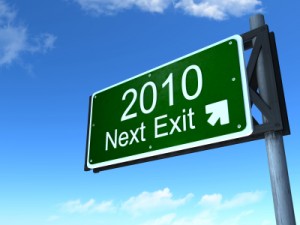 It’s the time of year when many of us conduct annual rituals that may include everything from strategic planning sessions for business to making New Year’s resolutions or setting Bold Goals for 2010 and beyond. We’ve found any such process to be much harder to do when we haven’t completed and let go of the past. It's very difficult, (impossible?), to really move forward when we are carting the past along with us. The process of letting go can include changing your attitude and perceptions about what the economy did to you, to digging very deep and letting go of some of the childhood stuff that shapes your life.
On the fun end of the spectrum, we have for many years put flip chart paper all over our walls when we have a New Year’s Eve party with a simple question on each, such as “What did I start and not complete?” or “What did I accomplish that I haven’t been acknowledged for?” or “What did I screw up that I didn’t get caught for?” Guests write on the charts all evening with colored markers and sometimes get even more creative with a touch of artistic display as well. On a number of occasions we have taken them all down at midnight and symbolically burned them.
It’s the time of year when many of us conduct annual rituals that may include everything from strategic planning sessions for business to making New Year’s resolutions or setting Bold Goals for 2010 and beyond. We’ve found any such process to be much harder to do when we haven’t completed and let go of the past. It's very difficult, (impossible?), to really move forward when we are carting the past along with us. The process of letting go can include changing your attitude and perceptions about what the economy did to you, to digging very deep and letting go of some of the childhood stuff that shapes your life.
On the fun end of the spectrum, we have for many years put flip chart paper all over our walls when we have a New Year’s Eve party with a simple question on each, such as “What did I start and not complete?” or “What did I accomplish that I haven’t been acknowledged for?” or “What did I screw up that I didn’t get caught for?” Guests write on the charts all evening with colored markers and sometimes get even more creative with a touch of artistic display as well. On a number of occasions we have taken them all down at midnight and symbolically burned them.
 This week on Thursday the US will celebrate Thanksgiving. We are getting close to the end of the year and many have already begun to reflect on all that has happened. It’s been an extraordinary year on many levels -- politically and financially our country has gone through a lot of change. Many people have also gone through a lot personally in areas including their finances, employment and home ownership.
As we come to Thanksgiving, and look back on this extraordinary year, we at 2130 Partners want to say “thank you” and express our gratitude. First to our team, that we fondly call “the collaborative.” We are grateful to have amazing, talented, and committed people to work with, collaborate with and have fun with.
This week on Thursday the US will celebrate Thanksgiving. We are getting close to the end of the year and many have already begun to reflect on all that has happened. It’s been an extraordinary year on many levels -- politically and financially our country has gone through a lot of change. Many people have also gone through a lot personally in areas including their finances, employment and home ownership.
As we come to Thanksgiving, and look back on this extraordinary year, we at 2130 Partners want to say “thank you” and express our gratitude. First to our team, that we fondly call “the collaborative.” We are grateful to have amazing, talented, and committed people to work with, collaborate with and have fun with. Our culture has an expectation of the picture perfect “Norman Rockwell” holiday experience. Family gathered around a beautifully set table, a lovely home-cooked holiday meal. Yet for many, many people, the holidays are one of the most stressful times of the year. With the state of the economy and many people’s business and/or personal finances, the holidays may be even more stressful than usual this year.
On a professional level, if you are a business owner, entrepreneur or executive your business may still be suffering from the state of the economy. At this time of year when employees are hoping for bonuses, parties or some other sort of acknowledgment, what will you be able to do this year to keep up morale? It may not be realistic from a budgetary standpoint to do much, but with all the stress and challenges, doing nothing just reinforces the sense that “things aren’t right” yet. It’s difficult for a team to perform at their peak when extremely stressed. Finding a way to reassure and boost morale is an important leadership move.
Our culture has an expectation of the picture perfect “Norman Rockwell” holiday experience. Family gathered around a beautifully set table, a lovely home-cooked holiday meal. Yet for many, many people, the holidays are one of the most stressful times of the year. With the state of the economy and many people’s business and/or personal finances, the holidays may be even more stressful than usual this year.
On a professional level, if you are a business owner, entrepreneur or executive your business may still be suffering from the state of the economy. At this time of year when employees are hoping for bonuses, parties or some other sort of acknowledgment, what will you be able to do this year to keep up morale? It may not be realistic from a budgetary standpoint to do much, but with all the stress and challenges, doing nothing just reinforces the sense that “things aren’t right” yet. It’s difficult for a team to perform at their peak when extremely stressed. Finding a way to reassure and boost morale is an important leadership move.
 The term “comfort zone” has become a popular way to describe how we are feeling about various activities we are taking part in – “that pushed me way out of my comfort zone,” or “that was not in my comfort zone,” are pretty common phrases these days.
When we talk about our “comfort zone” what we are talking about is our personal orbit, our range of personal activities. Each of us has a daily routine, a weekly routine and perhaps even a monthly or yearly routine. Generally speaking we are creatures of habit and we develop comfort zones we like, and of course, feel comfortable in.
The term “comfort zone” has become a popular way to describe how we are feeling about various activities we are taking part in – “that pushed me way out of my comfort zone,” or “that was not in my comfort zone,” are pretty common phrases these days.
When we talk about our “comfort zone” what we are talking about is our personal orbit, our range of personal activities. Each of us has a daily routine, a weekly routine and perhaps even a monthly or yearly routine. Generally speaking we are creatures of habit and we develop comfort zones we like, and of course, feel comfortable in. important phenomenon to understand. It works for us in critical ways. For example, it helps keep our body temperatures stable. As we know, we all have a set-point for body temperature that is on average 98.6 degrees. The homeostasis in our bodies helps insure that when our temperature fluctuates, it comes back to this comfortable set point. The downside is that when we challenge ourselves psychologically and emotionally in various ways, there can be a “homeostatic back lash,” and a strong pull to go back to our existing comfort zone until we have solidly established a new set point.
important phenomenon to understand. It works for us in critical ways. For example, it helps keep our body temperatures stable. As we know, we all have a set-point for body temperature that is on average 98.6 degrees. The homeostasis in our bodies helps insure that when our temperature fluctuates, it comes back to this comfortable set point. The downside is that when we challenge ourselves psychologically and emotionally in various ways, there can be a “homeostatic back lash,” and a strong pull to go back to our existing comfort zone until we have solidly established a new set point. When H1N1 knocked us out of the opportunity to speak at the Women’s Symposium on
When H1N1 knocked us out of the opportunity to speak at the Women’s Symposium on  Ultimately, 97 women students were selected to be part of the year long curriculum. Student feedback is already amazing. Here is a note from one of the women selected for the program: I am Cathy Tian, senior, majoring in English Translation. I am so lucky to be chosen as a member of World Academy. I write this letter to express my thanks to all of you. Thank you very much for all you have done and will done for us. Yesterday is an unforgettable day in my life and I will cherish every minute to learn with you all. I believe I can make a difference, I believe my dreams will come true. Thank you again and best regards. (In the picture: Suzanne, Patty and Allison at a candlelight welcoming ceremony for the students.)
Ultimately, 97 women students were selected to be part of the year long curriculum. Student feedback is already amazing. Here is a note from one of the women selected for the program: I am Cathy Tian, senior, majoring in English Translation. I am so lucky to be chosen as a member of World Academy. I write this letter to express my thanks to all of you. Thank you very much for all you have done and will done for us. Yesterday is an unforgettable day in my life and I will cherish every minute to learn with you all. I believe I can make a difference, I believe my dreams will come true. Thank you again and best regards. (In the picture: Suzanne, Patty and Allison at a candlelight welcoming ceremony for the students.) the World at Work, An International Summit of Leaders and Practitioners” with participants from 14 countries.
the World at Work, An International Summit of Leaders and Practitioners” with participants from 14 countries. 
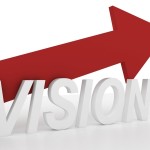 When we talk about creating a vision or a purpose is that something you actively do with your team? For yourself and your own life? Are you practicing a Vision-Focused approach to your leadership of your business? Your life? If yes, are you open to input from others? Do those around you feel safe providing feedback that may be uncomfortable or with which you might disagree? Are you ready to practice cooperation and alignment? Are you still in "command and control" thinking and behaviors?
When we talk about creating a vision or a purpose is that something you actively do with your team? For yourself and your own life? Are you practicing a Vision-Focused approach to your leadership of your business? Your life? If yes, are you open to input from others? Do those around you feel safe providing feedback that may be uncomfortable or with which you might disagree? Are you ready to practice cooperation and alignment? Are you still in "command and control" thinking and behaviors? This post will focus on the Chiapas, Mexico trip. One of the most remarkable dimensions of this trip was meeting a twenty-year-old indigenous mother and leader,
This post will focus on the Chiapas, Mexico trip. One of the most remarkable dimensions of this trip was meeting a twenty-year-old indigenous mother and leader, 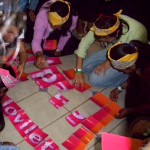 from six villages. Margarita co-facilitated this workshop, dealing calmly and brilliantly with women who were, for the most part, at least twice her age, (including her own mother). The workshop was a quarterly follow-up where they reviewed progress on their projects, designed new actions, and built new strengths together. At one point, we did an exercise that started with all of us blindfolded figuring out how to work together to assemble a puzzle. Afterwards we debriefed and there was sharing about the learning. This exercise was an amazing metaphor for what the women are faced with daily. They have a vision, but it's unclear how it will work out and they have to "feel around in the dark" for solutions. In the process they encounter everything from confusion, to fear, to resignation and the desire to quit. This all came to the surface during the exercise.
from six villages. Margarita co-facilitated this workshop, dealing calmly and brilliantly with women who were, for the most part, at least twice her age, (including her own mother). The workshop was a quarterly follow-up where they reviewed progress on their projects, designed new actions, and built new strengths together. At one point, we did an exercise that started with all of us blindfolded figuring out how to work together to assemble a puzzle. Afterwards we debriefed and there was sharing about the learning. This exercise was an amazing metaphor for what the women are faced with daily. They have a vision, but it's unclear how it will work out and they have to "feel around in the dark" for solutions. In the process they encounter everything from confusion, to fear, to resignation and the desire to quit. This all came to the surface during the exercise. are bold enough to take on the unknown, resilient enough to get up and go again after failure, creative enough to find solutions where none were apparent, and collaborative enough to draw power from each other.
are bold enough to take on the unknown, resilient enough to get up and go again after failure, creative enough to find solutions where none were apparent, and collaborative enough to draw power from each other.  Last week
Last week 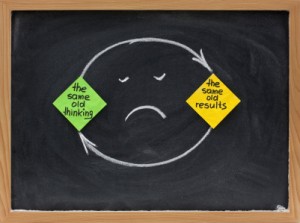 how healthy and fresh are your thought processes? When was the last time you challenged yourself to learn something new? How much are you reading? (And not reports and emails! Reading fiction for fun, or non-fiction topics that interest you?) Do you do puzzles – crossword or otherwise - to stimulate your cognitive abilities? We often repeat the same thought patterns and think about the same subjects day in and day out. Learning something new helps keep your brain healthy and your perspective fresh. For more information on how to keep your brain and thinking healthy visit
how healthy and fresh are your thought processes? When was the last time you challenged yourself to learn something new? How much are you reading? (And not reports and emails! Reading fiction for fun, or non-fiction topics that interest you?) Do you do puzzles – crossword or otherwise - to stimulate your cognitive abilities? We often repeat the same thought patterns and think about the same subjects day in and day out. Learning something new helps keep your brain healthy and your perspective fresh. For more information on how to keep your brain and thinking healthy visit 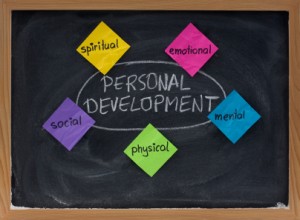 If you find you are having trouble finding your passion, designing a future you are excited about or reaching particular goals and dreams then hire a coach. Ask around and find someone who has an approach you are excited about pursuing. Partner with your coach so that you have the support you need to get where you want to go.
If you find you are having trouble finding your passion, designing a future you are excited about or reaching particular goals and dreams then hire a coach. Ask around and find someone who has an approach you are excited about pursuing. Partner with your coach so that you have the support you need to get where you want to go. There are at least four dimensions of health – mental, emotional, spiritual and physical. It’s pretty self-evident that the healthier you are, the better you can perform. Performance is foundational to leadership yet health is rarely part of the leadership conversation.
There are at least four dimensions of health – mental, emotional, spiritual and physical. It’s pretty self-evident that the healthier you are, the better you can perform. Performance is foundational to leadership yet health is rarely part of the leadership conversation. er day, (8 ounce glasses that is). Yet how many of us do it? If you can just do this piece, your health will be improved simply because you will be hydrated. Don’t like plain water? Squeeze half a lemon or lime in it. Still not good? A splash of cranberry or pomegranate juice has health benefits and helps with the taste, (provided you are doing just splash and you are doing real juice, not the high sugar filled kind.) The basics are covered in the works of Dr. Weil and Dr. Oz we mentioned above and being hydrated is one example of improving your health without feeling like you are taking hours out of your day for a huge program.
er day, (8 ounce glasses that is). Yet how many of us do it? If you can just do this piece, your health will be improved simply because you will be hydrated. Don’t like plain water? Squeeze half a lemon or lime in it. Still not good? A splash of cranberry or pomegranate juice has health benefits and helps with the taste, (provided you are doing just splash and you are doing real juice, not the high sugar filled kind.) The basics are covered in the works of Dr. Weil and Dr. Oz we mentioned above and being hydrated is one example of improving your health without feeling like you are taking hours out of your day for a huge program. have been skipping tests, get them done. If you don’t like your current doctor, ask around. Check with a friend or colleague whose health you admire and get a new physician to work with.
have been skipping tests, get them done. If you don’t like your current doctor, ask around. Check with a friend or colleague whose health you admire and get a new physician to work with.

 This morning in a one-to-one with a client, I was once again reminded how much and how easily even the seemingly most successful people can be derailed from handling the roadblocks and potholes they encounter in life.
From my perspective, what stops each of us is fear. It is unconsciously and instantaneously triggered when our Survival Brain connects something in the present with an experience stored in our mental File Cabinet from early childhood. I've heard those incidents described in various ways.
This morning in a one-to-one with a client, I was once again reminded how much and how easily even the seemingly most successful people can be derailed from handling the roadblocks and potholes they encounter in life.
From my perspective, what stops each of us is fear. It is unconsciously and instantaneously triggered when our Survival Brain connects something in the present with an experience stored in our mental File Cabinet from early childhood. I've heard those incidents described in various ways. 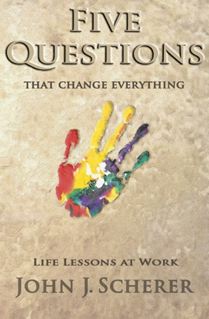 of the discussion in
of the discussion in  One of the expressions we hear often from our clients these days, in reference to themselves and/or their team members, is overwhelm. Whether they say it or not, we definitely see it and also its consequence - inaction-- quite regularly. Another, (and perhaps more precise), word that describes what we see is 'unraveled.'
"Overwhelm" is actually a fairly general word, a sort of "catch all" phrase. So what are people really saying when they use it? It could mean they are drowning, engulfed, rendered totally ineffective by decisive defeat or, at the least, impaired severely in spirit and health. If they are unraveled, we could also say they have fallen apart. Regardless of the precise wording, when people are in this state there seems to be no access to freedom, creativity, leadership, productive action, or even good health.
One of the expressions we hear often from our clients these days, in reference to themselves and/or their team members, is overwhelm. Whether they say it or not, we definitely see it and also its consequence - inaction-- quite regularly. Another, (and perhaps more precise), word that describes what we see is 'unraveled.'
"Overwhelm" is actually a fairly general word, a sort of "catch all" phrase. So what are people really saying when they use it? It could mean they are drowning, engulfed, rendered totally ineffective by decisive defeat or, at the least, impaired severely in spirit and health. If they are unraveled, we could also say they have fallen apart. Regardless of the precise wording, when people are in this state there seems to be no access to freedom, creativity, leadership, productive action, or even good health. connect you with the people around you, and restore your spirit.
connect you with the people around you, and restore your spirit. As many have written, (including us), these are extraordinary times. The thing is, they are likely more extraordinary than most of us realize. During today's
As many have written, (including us), these are extraordinary times. The thing is, they are likely more extraordinary than most of us realize. During today's  We can go back through the history of the earth by drilling into and examining the ice cores in Antarctica. In doing this, scientists have discovered that these changes in earth cycles are really intense and they are also brief, so the transition we are currently experiencing is unlikely to go on for generation after generation. In fact, it will likely be only one generation. So we as a civilization must respond now. The choices each of us are making today will determine our collective future.
We can go back through the history of the earth by drilling into and examining the ice cores in Antarctica. In doing this, scientists have discovered that these changes in earth cycles are really intense and they are also brief, so the transition we are currently experiencing is unlikely to go on for generation after generation. In fact, it will likely be only one generation. So we as a civilization must respond now. The choices each of us are making today will determine our collective future. If you are not a believer in reviewing ancient history, how about the results of some recent scientific studies? Between the years 1998 and 2000, 400 studies were designed to identify the optimum amount of violent competition in a species. They looked at numerous varieties of species and the findings were consistent - the optimal amount of competition is "zero." They found that cooperation among species is what insures their survival. So the only way we can make successfully make this transition is to examine and rid ourselves of our notions of 'Darwinian competition' and learn to cooperate and help each other. This means at every level and on a global scale - not just how do I cooperate with my next door neighbors and others in business? But how do nations cooperate with other nations?
If you are not a believer in reviewing ancient history, how about the results of some recent scientific studies? Between the years 1998 and 2000, 400 studies were designed to identify the optimum amount of violent competition in a species. They looked at numerous varieties of species and the findings were consistent - the optimal amount of competition is "zero." They found that cooperation among species is what insures their survival. So the only way we can make successfully make this transition is to examine and rid ourselves of our notions of 'Darwinian competition' and learn to cooperate and help each other. This means at every level and on a global scale - not just how do I cooperate with my next door neighbors and others in business? But how do nations cooperate with other nations? So ask yourself - who have you helped today? Did you come up with a great cooperative joint venture with another company that will create a "win win" for both businesses? Did you help a colleague get an important project approved or completed? Did you make time to help a neighbor, a friend, or someone in one of your communities? Did you create just a little peace by letting someone get on the freeway more easily or make a safe lane change? It will take a cumulative effect of many cooperative acts great and small, but we can do this if we do it together from a mindset of cooperation instead of a mindset of competition.
So ask yourself - who have you helped today? Did you come up with a great cooperative joint venture with another company that will create a "win win" for both businesses? Did you help a colleague get an important project approved or completed? Did you make time to help a neighbor, a friend, or someone in one of your communities? Did you create just a little peace by letting someone get on the freeway more easily or make a safe lane change? It will take a cumulative effect of many cooperative acts great and small, but we can do this if we do it together from a mindset of cooperation instead of a mindset of competition. Blind Adventurer," give an hour and a half presentation on his experiences, motivations, lessons learned, and extraordinary worldview, was just that. Erik has reached the summit of the seven most challenging mountains in the world, including Everest, and successfully returned.
Erik's views are particularly applicable in navigating the
Blind Adventurer," give an hour and a half presentation on his experiences, motivations, lessons learned, and extraordinary worldview, was just that. Erik has reached the summit of the seven most challenging mountains in the world, including Everest, and successfully returned.
Erik's views are particularly applicable in navigating the  venues in which we find ourselves, summits that express the essence of who we really are.
venues in which we find ourselves, summits that express the essence of who we really are. t part of leadership is how we pass it on to others."
t part of leadership is how we pass it on to others."